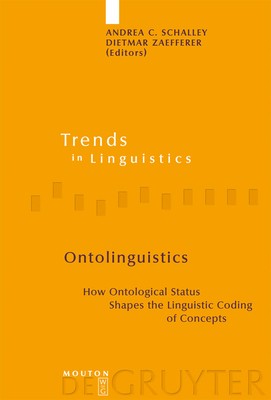
- We will send in 10–14 business days.
- Publisher: Walter de Gruyter
- ISBN-10: 3110189976
- ISBN-13: 9783110189971
- Format: 16.6 x 23.3 x 3.1 cm, hardcover
- Language: English
- SAVE -10% with code: EXTRA
Ontolinguistics (e-book) (used book) | bookbook.eu
Reviews
Description
Current progress in linguistic theorizing is more and more informed by cross-linguistic (including cross-modal) investigation. Comparison of languages relies crucially on the concepts that can be coded with similar effort in all languages. These concepts are part of every language user's ontology, the network of cross-connected conceptualizations the mind uses in coping with the world.
Assuming that language comparability is rooted in the comparability of user ontologies, the idea of the present volume is to further instigate progress in linguistics by looking behind the interface with the conceptual-intentional system and asking a still underexplored question: How are ontological structures reflected in intra- and cross-linguistic regularities? This question defines the research program of ontology based linguistics or ontolinguistics.
Recent advances in the theory of language have been characterized by an emphasis on external explanatory adequacy and thus on relating language to other phenomena. The research program introduced in this volume adds a decisively distinct and fresh aspect to this emerging new contextualization of the field by bringing together insights from different areas, mainly linguistics, but also neuroscience, philosophy, and artificial intelligence. In providing these disciplines with a new common task, the exploration of the impact of ontological structures on linguistic regularities, the ontolinguistic approach promises to develop into a vital branch of cognitive science.
Documenting the beginnings, the book aims to instigate future interdisciplinary research in this area. It will be of interest to researchers in linguistics, artificial intelligence, philosophy, and cognitive science in general.
EXTRA 10 % discount with code: EXTRA
The promotion ends in 10d.04:38:58
The discount code is valid when purchasing from 10 €. Discounts do not stack.
- Publisher: Walter de Gruyter
- ISBN-10: 3110189976
- ISBN-13: 9783110189971
- Format: 16.6 x 23.3 x 3.1 cm, hardcover
- Language: English English
Current progress in linguistic theorizing is more and more informed by cross-linguistic (including cross-modal) investigation. Comparison of languages relies crucially on the concepts that can be coded with similar effort in all languages. These concepts are part of every language user's ontology, the network of cross-connected conceptualizations the mind uses in coping with the world.
Assuming that language comparability is rooted in the comparability of user ontologies, the idea of the present volume is to further instigate progress in linguistics by looking behind the interface with the conceptual-intentional system and asking a still underexplored question: How are ontological structures reflected in intra- and cross-linguistic regularities? This question defines the research program of ontology based linguistics or ontolinguistics.
Recent advances in the theory of language have been characterized by an emphasis on external explanatory adequacy and thus on relating language to other phenomena. The research program introduced in this volume adds a decisively distinct and fresh aspect to this emerging new contextualization of the field by bringing together insights from different areas, mainly linguistics, but also neuroscience, philosophy, and artificial intelligence. In providing these disciplines with a new common task, the exploration of the impact of ontological structures on linguistic regularities, the ontolinguistic approach promises to develop into a vital branch of cognitive science.
Documenting the beginnings, the book aims to instigate future interdisciplinary research in this area. It will be of interest to researchers in linguistics, artificial intelligence, philosophy, and cognitive science in general.


Reviews